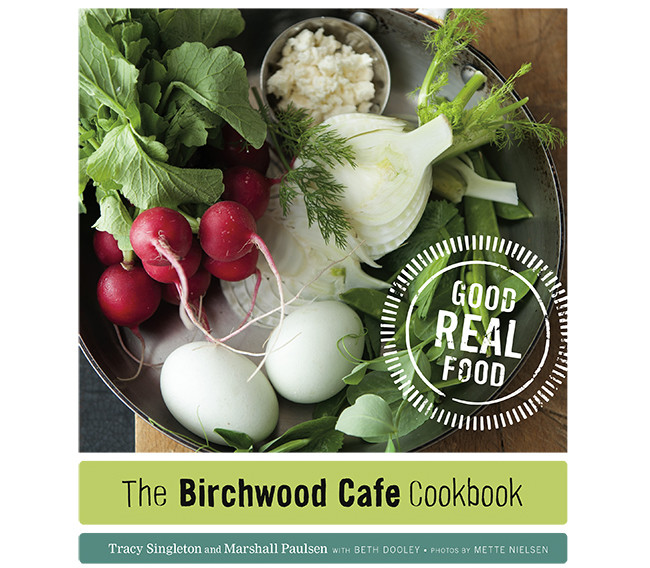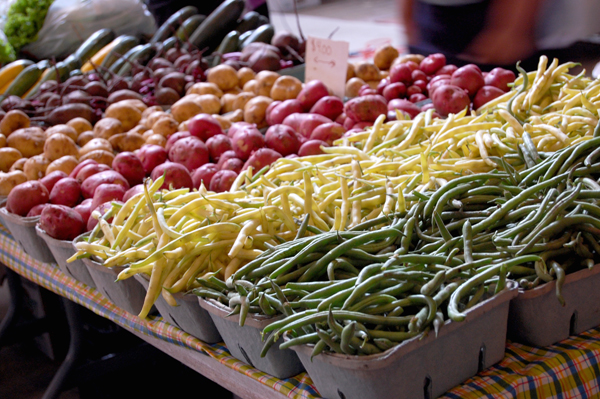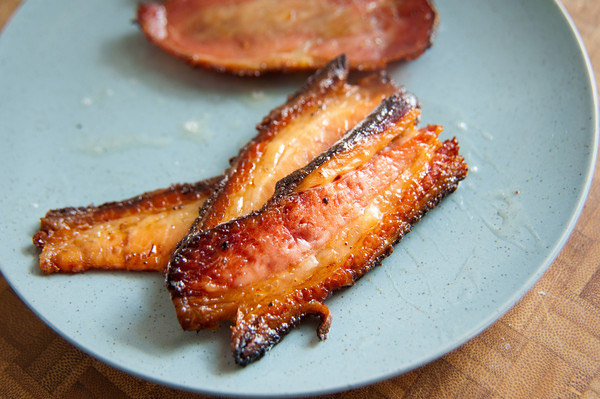
The Heavy Table, the University of Minnesota Press, and the Birchwood Cafe team are pleased to announce (and publish) the results of our Birchwood Cafe Cookbook flash fiction contest. Thank you to everyone who entered, and congratulations to our three winners!

3RD PLACE
Long Stretch of Ordinary Days
by Greg Biehn
I often think that I need to say or do something important. I need to have an impact, leave a mark, an impression, or do well. I am getting older, and it can feel like time is running out — a speeding train that I watch as it passes me in the back pasture. My mind circles and circles — what am I missing?
I pull the apples off the old orchard tree in the back pasture, dodging the male goats as they grunt and snort inspecting my scent. The branches bow and sway, moving the sweet dangling fruit within my reach with some hitting the ground soon to find the mouth of a hungry goat. Many folks don’t like these gruff guys, but I do. I like how they are a bit edgy, confident and even though in breeding season they stink with the smell of their own urine and look like an insane outpatient, they walk with a strut that says “I am hot stuff and I don’t care if you don’t get it.” I like that confidence, that love of self. The female goats are attracted to the smell, and it tends to lend itself as a calling card to a first encounter. The scent stays on my pants but I don’t mind — I’m hot stuff.
I pull out the rolling pin that I used with my dad when he would come to visit. We would bake together. My dad owned a bakery and was a baker in the Army. He knew the ropes and would often pick up my pies, inspecting the bottom crust through the glass to see if it was done, If not, it ended up back in the oven often with questions — “What type of flour did you use Greg?” “How much butter?” “Did you set a timer?” He was a stickler for a browned bottom crust — “No one likes a mushy crust Greg.” My dad is long gone, but I still check my crusts. As I stare up, through the glass, towards the light, I think of him, and know he would approve. I set the pie to cool in the pantry. It is more than a pie, it is a memory. All day long as I pass that pie I smell the cinnamon; I smell the scent of butter and the sweet slices of the apples from the back orchard mixed with the thick oily scent of the goat left on my pants — I wonder what my dad would think. His boy from the suburbs of New Jersey — a farmer, a goat breeder, raising chickens that roam in open vegetable gardens alongside the cherry trees and raspberry bushes — the farm I created with my partner Allan, now my husband — so much for him to take in, so different than his 95 years could imagine. But we could always look up, and tip that pie crust with our finger and agree that no one likes a mushy crust.
My garden slopes up the hill just past two cherry trees. In early spring they are a bright red, full of fruit that will soon be slipped into freezer bags or tossed with sugar, tapioca and almond extract to create a cherry pie. In the deep white of winter, the sweet dark juice is a taste that lifts my spirit and reminds me to hold on — the season will turn and all that is green is not lost forever.
The garlic is soon ready to be harvested. It is such an easy thing to plant and almost always yields a healthy, sturdy crop. In October I stick the individual cloves into the warm soil about six inches deep. I only push a little soft dirt over them and then pile on the straw, thick and deep, and that is it. In the early spring the tiny green shoots will emerge. I keep them watered and weeded and by July the long, elegant garlic scapes can be cut off and cooked, followed by digging up the bulbs carefully so as not to cut or bruise them. I leave the dirt on them and let them air dry on an old window screen propped up between two chairs. In a couple weeks I have garlic — fresh and pungent, not bitter at all. I save a few bulbs to plant again in October, and the cycle repeats and repeats.
There are patterns on the farm. The seasons, the cycles, this pulse of life that keeps a familiar rhythm. But there are gentle changes as well — the daughter of our female barn cat now licks and cleans her mother. The female goats that fought now curl their necks around each other and sleep. A chicken decides to nest in another part of the barn, and the hunt is on for her pale blue egg. Tomatoes are planted in a new garden bed. We move the strawberries for better light. I see these changes when I slow down, when I make room for them. Life can change on a dime with an accident; a diagnosis — it seems like a million things could go wrong. These ordinary days, these long stretches of sweet, ordinary days are enough. I am ordinary and I am enough.

2ND PLACE
Scratch
by Shawna Mayer
Knowing when to plant is key. Every spring it’s a gamble. Wait until after the last frost, but not so long that the spinach will finally leaf in and immediately bolt during the first hot days of June.
Too much rain is always a concern. Some years, tender plants are drowned. We replant, but they inevitably succumb to the heat.
I am nearly forty years old and every season is the same. Always something to worry over. Bugs, rabbits — the year the neighbor’s horses cleaned us out, and what they hadn’t eaten, they’d crushed, leaving shoe tracks along with a pile of natural fertilizer on the soft soil.
This year I’m worried about Mom. She’d plant all on her own if I didn’t insist — even with those twin scars running down the front of her knees.
“Look how far I can bend my leg now,” she demonstrates while I wince.
“Will you just let me plant this year?” I ask.
She ignores me and sets about hauling supplies from the shed. Then she ties a bandana around her hair. “You just don’t stand around while other people are working” is coded into her DNA.
Mom was raised in Southeast Missouri, picking and chopping cotton along with her sister after their mother died when she was two. On her way to eighteen she also lost her father and grandmother. Her older sister took over raising her until Mom bought a bus ticket north to the city. She got a job as a legal secretary and worked her way through college, one class at a time. It’s the kind of backstory she could run for Congress on, if she were that type.
I hammer the stakes, secure the twine, unspool it down the row, and repeat.
“As crooked as a dog’s hind leg,” Mom once said about the rows in a neighbor’s garden, teaching me that a family’s moral rectitude can be reflected in the straightness of their garden rows.
Mom flips the hoe and uses the blunt end to make a furrow.
The ground prepared, I kneel and shake a few dozen seeds into my palm, and then I drop them spaced an inch or so a part. Mom follows with the hoe, deftly covering each seed with earth.
And as we work our way from end to end, we talk. The conversation meanders from the neighbors and their shoddy horse fence, to the frogs’ intermittent burping in the pond across the way.
“A good year for fat raccoons,” Mom predicts.
“Did I tell you, last week we had a provost in for a meeting? He left his lights on and the battery died. I was the only one with jumper cables. This guy didn’t even know where to attach ’em.”
“Oh Lord!”
“He asked me, ‘You think I can just put them anywhere?’”
Mom laughs.
“He had to get out the owner’s manual. Apparently batteries aren’t front and center in BMWs.”
Working with academics has taken getting used to, with their substantial egos and narrow interests. Somehow, in all that time spent researching for their Ph.D.s, they seem to lose the ability to do things. Like unjam a copy machine or forward a phone call.
I straddle the line: I have the education, but I can’t quite let go of common sense. Sometimes I wonder what Mom’s side of the family would have thought of me. They’d probably find me bookish and unuseful, too squeamish to kill a chicken or butcher a hog.
Stupefied that I haven’t taken a bite of meat since I was fifteen.
Finally the mounds of soil and the neat rows are spread out behind me, and I stop to stretch my back.
Then it’s done, for now.
It will be a couple of weeks before the spinach sprouts. Eight, before first pick. I will do that too, sparing my mother as much of the wearying work as she’ll allow. Each leaf I’ll pull individually until my thumbnail carries a half-moon of green grit. We’ll fill bucket after bucket, then rinse it all in the kitchen sink. Some would be boiled down right there, to be frozen for the winter, when we’ll most need a reminder of these gentle, light-filled days of spring.
But some of the sweet green leaves will be washed and dumped into the biggest silver bowl in the house. It will ring like a bell when the knife’s edge hits it as Mom slices tomatoes and green onions into the salad.
I learned to cook as a bored teenager home for summer vacation, experimenting with the recipes in our only cookbook — the classic orange-covered Betty Crocker. Thirty years later that book is still there. The stickiness of the pages has become the best marker of the popularity of any recipe, much to my mother’s frustration. Even so, it’s rarely opened now when it’s so easy to pull up the modern version of an old favorite on my phone.
But there’s one recipe we still use every year, by the book: the hot dressing for wilted spinach salad. I know the ingredients, but the recipe reminds me of the correct ratios for vinegar, oil, sugar, and water.
It’s our ritual. After the concoction boils, I pour it over the spinach and watch it shrink. Then I’ll reach in the bowl and pluck the first bite with my fingers. It will taste like sunshine, strength, and the promise of continued good health. I’ll be once again reminded that I’m good for something other than citing sources in a research study.
Mom will reach in and slurp her first bite. We will smile at our communion.
My friends post their foodie pictures on Instagram, brag about their homemade meals with artisan ingredients. But this ritual will stay private, personal, as we know what nourishment is, and how it takes getting dirt beneath our fingernails to truly make anything from scratch.

1st PLACE
Grandma Bear
by Shel Silvernail
We called her Grandma Bear. Her real name was Emma, but there was this story that she singlehandedly killed a bear that was threatening her chickens. Turns out she just scared off the bear by firing grandpa’s old deer rifle into the air from the open kitchen window, but when I was a kid I heard she beat it to death with a shovel.
The only time I spent any real time with her was the summer after I graduated from college. I had planned on changing lives as a social worker, but I spent the summer before my senior year doing an internship with child protection and my world became clouded with disillusionment. I needed somewhere to figure out my next steps, and Grandma Bear needed help.
At Christmas the year before, as my parents sat talking with the uncles and aunts, I helped Grandma make coffee and arrange her traditional Norwegian cookies on a tray.
And then I helped catch her fall when her whole right side gave out.
By spring she was well enough to come home from rehab, but not to her rustic little cabin by the lake. Instead, she moved into my old room. I don’t know what she thought of my collection of Grateful Dead posters, but my room was on the first floor by the bathroom so that’s where she landed.
Since I had no job, no prospects, and no clue about what to do next, I ended up spending the summer cleaning up Grandma Bear’s cabin in the woods while searching for a vision to guide my life.
“You should probably leave now, ma’am.”
That gravelly voice snapped me back to reality. I had been standing and staring at the tiny dwelling that rose like a mushroom out of the forest floor above Dry Lake. The amused smile I showed him as I turned around was probably not my best choice, but the combination of hostility and politeness in his voice matched his plaid shirt and faded jeans in a way that was so quintessentially “up north” that it seemed as unreal as the call of a loon.
“This is my grandmother’s place, so I’m not going anywhere. Who are you?”
“Name’s Roger. Of Roger’s Meats.” He pointed over his shoulder where his “meats” were presumably located. “Just looking out. Can’t have people wandering around.”
I smiled even bigger, “Hi Roger of Roger’s Meats. I’m Emma. After my grandmother. I am spending the summer here, cleaning this place up a bit. Thanks for ‘looking out.’”
“Yeah, well. She OK?” He squinted at me and pursed his lips in a way that I think was supposed to express sympathy.
“It’s not good. It’s possible she may never get back here, but I just can’t believe that. This is her home.”
The next weeks involved staring, moping, and cleaning. Roger came by occasionally to “check in” and ended up helping with things like unclogging the kitchen drain and fixing the back door. He was a good teacher for someone who didn’t talk much. I couldn’t get him to talk about himself, but I could tell from the scents he dragged in that Roger’s Meats had a smokehouse and that he didn’t much like doing laundry.
After a few weeks it became obvious to me that finding myself was not going to happen. I lit on a new idea: if Grandma could come stay here with me, we could sort through some of her old stuff. Roger helped me build a railing to the front door, and with a slow shuffle and slurred mumblings, Grandma Bear came home.
“Dasha ung eth …”
“That’s uncle Ted?” I asked. We were looking at a snapshot of a tall man in a Navy uniform that I had found in an old book. “I didn’t know he was in the Navy.”
“Alla voys.”
“All of your boys served? Really? I only knew about Dad.”
“Eh.”
Our conversations were all like this: short and nearly incomprehensible. But they were enough.
In between looking through pictures, sorting and labeling boxes of junk, and sitting on the porch watching loons fish the lake, Grandma taught me how to make her Christmas cookies. It felt surreal eating krumkake in August, but we had the iron and the time and Grandma had knowledge to share. Each cookie is cooked and then shaped individually: to make enough for our whole family would take most of the day. They had always been my favorite but now I felt guilty for past holidays when I unthinkingly ate four or five at a time. When I asked, often, why she spent so much time making these every single year, Grandma answered with a shrug. I spent a lot of time wondering what that shrug meant.
We made batch after batch of sandbakkels, too, and traded them with Roger in exchange for fresh-smoked bacon and sausages. Those buttery little gobs of dough have to be pressed perfectly into individual fluted tins. If the dough is too thick the cookie will be chewy; if it is too thin it will burn; if it is uneven it ends up spotty. Eventually I learned how to get them all crisp and perfectly golden. That this would be my job going forward was something neither of us would ever formally acknowledge, but when I closed up the cabin for good in October, the krumkake iron and sandbakkel tins came home with me.
Grandma Bear died that fall. Everyone knew the end was coming but we never talked about it, and no one cried at her funeral. I sat dry eyed in the church pew with my stoic family, feeling the gravity of life. I had started the summer hoping to find my future, my path, my vision. Instead I made cookies and contemplated the meaning of a shrug.
When the service was over, we retired to the church basement for refreshments. They served store bought cookies. It made me cry.

Comments are closed.